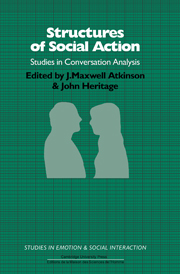Book contents
- Frontmatter
- Contents
- Preface
- Transcript notation
- 1 Introduction
- PART I ORIENTATIONS
- 2 Notes on methodology
- 3 On some questions and ambiguities in conversation
- PART II PREFERENCE ORGANIZATION
- PART III TOPIC ORGANIZATION
- PART IV THE INTEGRATION OF TALK WITH NONVOCAL ACTIVITIES
- PART V ASPECTS OF RESPONSE
- PART VI EVERYDAY ACTIVITIES AS SOCIOLOGICAL PHENOMENA
- References
- Index of names
- Subject index
2 - Notes on methodology
Published online by Cambridge University Press: 05 May 2010
- Frontmatter
- Contents
- Preface
- Transcript notation
- 1 Introduction
- PART I ORIENTATIONS
- 2 Notes on methodology
- 3 On some questions and ambiguities in conversation
- PART II PREFERENCE ORGANIZATION
- PART III TOPIC ORGANIZATION
- PART IV THE INTEGRATION OF TALK WITH NONVOCAL ACTIVITIES
- PART V ASPECTS OF RESPONSE
- PART VI EVERYDAY ACTIVITIES AS SOCIOLOGICAL PHENOMENA
- References
- Index of names
- Subject index
Summary
I want to propose that a domain of research exists that is not part of any other established science. The domain is one that those who are pursuing it have come to call ethnomethodology/conversation analysis. That domain seeks to describe methods persons use in doing social life. It is our claim that, although the range of activities this domain describes may be as yet unknown, the mode of description, the way it is cast, is intrinsically stable.
Following are some central findings of the researches in which I am engaged.
The detailed ways in which actual, naturally occurring social activities occur are subjectable to formal description.
Social activities – actual, singular sequences of them – are methodical occurrences. That is, their description consists of the description of sets of formal procedures persons employ.
The methods persons employ to produce their activities permit formal description of singular occurrences that are generalizable in intuitively nonapparent ways and are highly reproducibly usable.
Such findings have significance for what it is that sociology can aim to do, and for how it can proceed. In brief, sociology can be a natural observational science.
The important theories in the social sciences have tended to view a society as a piece of machinery with relatively few orderly products, where, then, much of what else takes place is more or less random.
- Type
- Chapter
- Information
- Structures of Social Action , pp. 21 - 27Publisher: Cambridge University PressPrint publication year: 1985
- 39
- Cited by

